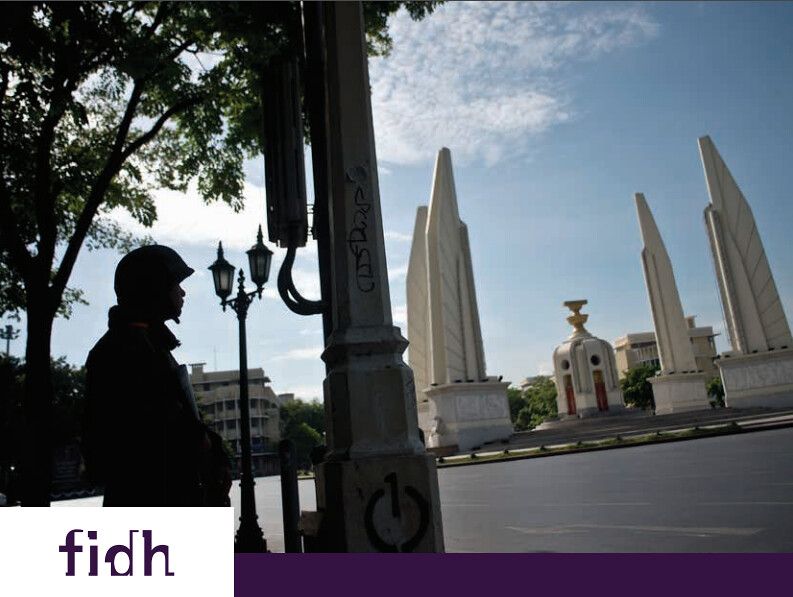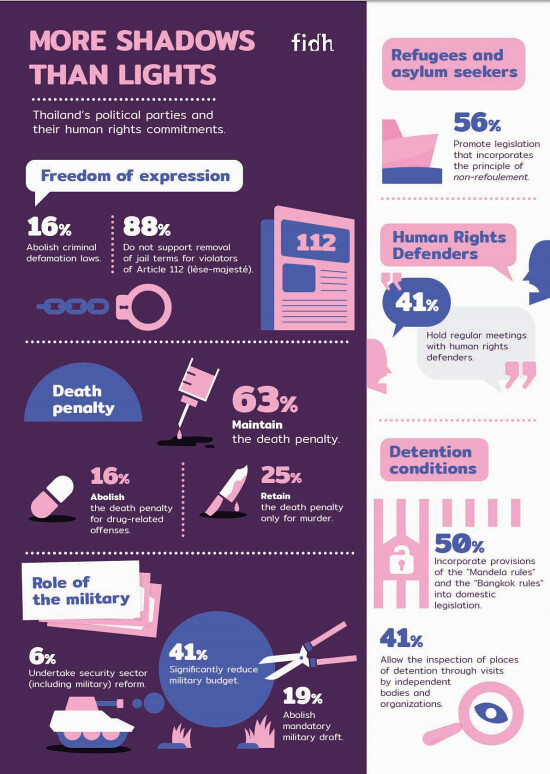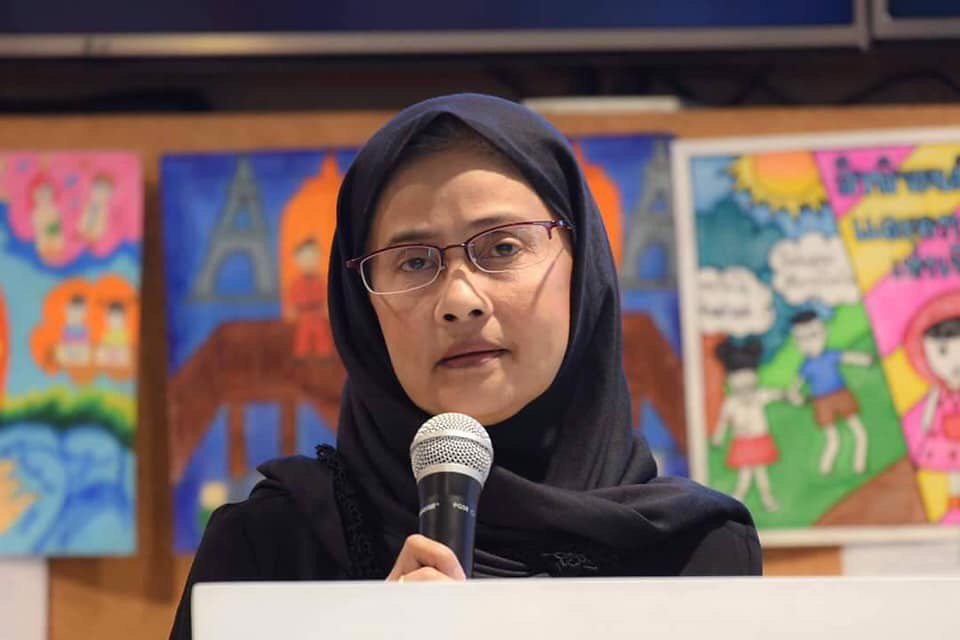On 14 March 2019, the International Federation on Human Rights (FIDH) held a press conference at the Foreign Correspondents' Club of Thailand to launch More Shadows than Lights: Thailand’s Political Parties and Their Human Rights Commitments, a survey of the human rights situation and 32 political parties in Thailand (read the full report here).

More Shadows than Lights
Mr. Andrea Giorgetta, Director of FIDH Asia, Ms. Debbie Stothard, Secretary-General of the FIDH, Angkhana Neelaphaijit from the National Human Rights Commission of Thailand, and Yingcheep Atchanont from iLaw, joined the press conference. The Ambassador of Switzerland and diplomats from European countries, also attended.
The conference began with a brief summary by Mr. Andrea Giorgetta, starting with a statement that junta’s repressive NCPO orders are still in place and the junta has been interfering with the election process, most evident in election date delays. With 250 senators appointed by the junta and a 20-year strategy which ties the hands of future governments, the military will still have influence over Thailand even after the general election.
Chronology of election date delays
Since taking power in the 22 May 2014 coup, the NCPO has repeatedly promised to hold a general election to return the country to civilian rule, in accordance with its so-called roadmap. However, the NCPO repeatedly delayed its initial pledge to hold the polls.
- 27 June 2014: NCPO head General Prayut Chan-o-cha said the next election would likely be held in October 2015.
- 27 May 2015: The junta confirmed the election would not be held until September 2016.
- 26 January 2016: General Prayut said the election would go ahead in mid-2017.
- 29 January 2016: CDC Chairman Meechai Ruchupan said the NCPO’s plan to hold elections in mid-2017 would be delayed by a “minimum of two to three months.”
- 21 September 2016: General Prayut told the UN General Assembly that elections would be held in late 2017.
- 5 January 2017: General Prayut said polls would not be held until early 2018.
- 8 October 2017: General Prayut said the election would be held in November 2018.
- 25 January 2018: The junta-appointed National Legislative Assembly (NLA) passed the law on election of MPs and inexplicably voted to delay its enactment until 90 days after its publication in the Gazette, effectively postponing the election date until February 2019.
- 27 February 2018: General Prayut promised to hold the election by February 2019.
- 25 June 2018: Deputy Prime Minister Wissanu Krea-ngam said the election would be held between 24 February and 5 May 2019, at the latest.
- 11 December 2018: The Election Commission said the election would be held on 24 February 2019.
- 3 January 2019: Deputy Prime Minister Wissanu Krea-ngam said the election date would likely be delayed from 24 February to avoid post-election activities from overlapping with the coronation ceremonies for King Maha Vajiralongkorn, scheduled to be held from 4 to 6 May 2019.
- 10 January 2019: Deputy Prime Minister Wissanu Krea-ngam hinted at a further election delay, due to concerns that the election process would overlap with the coronation ceremonies for King Maha Vajiralongkorn.
- 15 January 2019: A senior Election Commission official said that the election could not take place on 24 February because the body did not have “enough time to organize it.” The official indicated the new possible dates for the polls were either 10 or 24 March 2019.
- 23 January 2019: The Election Commission announced that the election would be held on 24 March 2019.
Source: FIDH
The report highlights positive developments regarding human rights defenders, refugees, and detention conditions. According to the report, 42% of the political parties hold regular meetings with human rights defenders, 56% promote legislation that incorporates the principle of non-refoulement, while a significant number of political parties promise to solve overcrowding and improve detention conditions in line with international minimum standards.
However, the shadows remain regarding freedom of expression, the death penalty, and the role of the military. 88% of political parties still do not support removal of jail terms for violators of the lèse majesté law, 63% still support retention of the death penalty, and less than half (41%) support a reduction of the military budget in the context that the junta still tightly controls the election environment and its repressive legal framework remains in place.
Ms. Debbie Stothard highlighted impunity. The political parties have to work harder to support impartial investigations into allegations of torture, enforced disappearances, and extra judicial killings by the police and military. Ms. Stothard also highlighted women’s rights in Thailand, saying that only 16% of political parties are committed to decriminalizing abortion and only 31% promote more women’s participation in local and national government.

Ms Stothard also mentioned big corporates in Thailand and their investment and infrastructure projects which may have an impact on local communities. Thailand’s National Action Plan for Business and Human Rights is currently in development but has little participation from civil society.
Thailand’s long history of impunity
Two days before the event was the 15th anniversary of Somchai Neelaphaijit’s enforced disappearance, and his wife, Angkhana Neelaphaijit of the National Human Rights Commission of Thailand, highlighted the issue of impunity.

Angkhana Neelaphaijit
“While Thailand has a long history of impunity, I haven’t seen any political party with a clear policy to end impunity. No party mentions the right to know the truth of the victims of the major human rights violations and how perpetrators will be brought to justice – especially in the emblematic cases of the Tak Bai and Krue Se massacres in the southern border provinces, or the killings during the political crackdown in Bangkok in 2010.”
However, Angkhana also highlighted the prospects. “On 7th March, when Amnesty International Thailand organized a public debate on human rights policies, one of the questions was about enforced disappearance,” said Angkhana. “And many political parties made the commitment that if they join the government they will ratify the Convention on Enforced Disappearances and amend the draft organic law on Torture and Enforced Disappearance to comply.”
Angkhana Neelaphaijit also discussed the Deep South. According to Angkhana, many political parties want to replace the special laws with the Criminal Code and the Criminal Procedure Code to avoid arbitrary arrests and detentions. Many parties focus on civilian-based policies to promote decentralization in the Deep South. However, in these areas, people who also suffer are women and LGBT.
“On the question of the mother tongue in the Deep South, no party promises to allow the Malay language to become an official language. Regarding gender equality for Malay Muslim women and LGBT persons, it is still not clear for Malay Muslim women how to end forced marriage and all kinds of gender-based violations including the lack of the right to divorce under Islamic Family and Inheritance Law, the lack of the right to work and access to education.”
However, there are some positive signs. “More candidates are from ethnic minorities such as Karen activists, Shan, Yunnanese and Malay Muslims in the south. Political parties are more inclusive of vulnerable groups such as Malay Muslim women in the Deep South. The Mahachon Party is outstanding as the party of LGBT candidates and its policies focus on the 6-7 million LGBTs eligible to vote in this election. … There are more policy debates, including on human rights policies, but Palang Pracharat hasn’t been very interested to join these.”
Surprised, not surprised
After reading the report, Yingcheep Atchanont from iLaw said that he was surprised and not surprised. The findings that surprised him are the political parties’ commitment to support refugees and asylum seekers and prisoners. But the finding about the death penalty did not surprise him. He said he sympathizes with the Future Forward Party which did not mention the abolition of the lèse majesté law and capital punishment in order to go along with the public sentiment. Yingcheep also emphasized the importance of having a free and fair election, as now the country will have 250 unelected senators and is still under the NCPO’s restrictions.
Repressive NCPO orders and announcements still in place
- NCPO Announcement 97/2014, issued on 18 July 2014, bans “criticism of the work of the NCPO” and the dissemination of information that could harm national security, cause confusion, or incite or provoke “conflict or divisions” within the country by media outlets.
- NCPO Announcement 103/2014, issued on 21 July 2014, amended Announcement 97/2014 to change the clause banning “criticism of the work of the NCPO” to criticism with false information with dishonest intent to destroy the credibility of the NCPO.
- NCPO Order 3/2015, issued on 1 April 2015. Article 5 of Order 3/2015 authorizes the military to issue orders that prohibit “the propagation of news or […] any other media that contains [...] information that is intentionally distorted to cause public misunderstanding that affects national security or public order.”
- NCPO Order 3/2015 also grants broad, unchecked powers to military officers to investigate, arrest, and detain persons without charge or judicial review for up to seven days.
- NCPO Order 41/2016, issued on 14 July 2016, grants the National Broadcasting and Telecommunications Commission (NBTC) broad, unchecked powers to shut down radio or TV stations that broadcast information considered a threat to national security
Source: FIDH
Pravit Rojanaphruk, Senior Journalist of Khaosod English, made an interesting observation that the Future Forward Party may be being pragmatic during its election campaign. As it is under constant attack, it avoids talking about it for now. He also asked the FIDH why Pheu Thai and Palang Prachara, the big political parties in Thailand, are not in the report. Giorgetta answered that some parties refused to answer the survey from the outset, such as Palang Pracharat, whereas Pheu Thai said it would answer the survey, but the reply never came.
FIDH is an international human rights NGO federating 184 organizations from 112 countries.
Prachatai English is an independent, non-profit news outlet committed to covering underreported issues in Thailand, especially about democratization and human rights, despite pressure from the authorities. Your support will ensure that we stay a professional media source and be able to meet the challenges and deliver in-depth reporting.
• Simple steps to support Prachatai English
1. Bank transfer to account “โครงการหนังสือพิมพ์อินเทอร์เน็ต ประชาไท” or “Prachatai Online Newspaper” 091-0-21689-4, Krungthai Bank
2. Or, Transfer money via Paypal, to e-mail address: [email protected], please leave a comment on the transaction as “For Prachatai English”
